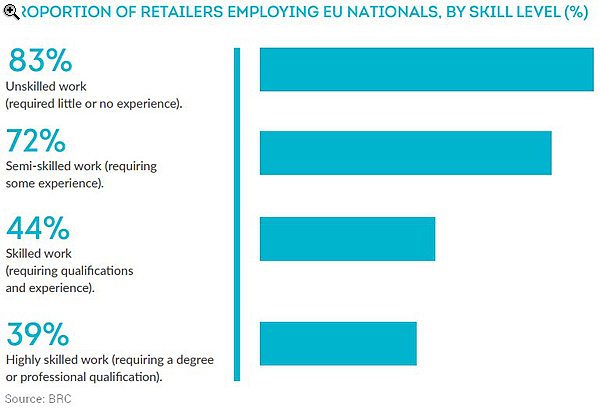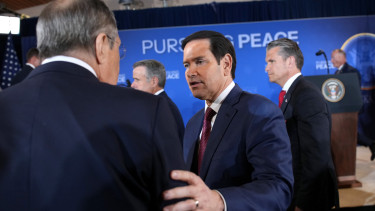This is what could hit Tesco hard, not the Hungarian government
Due to the lack of certainty about the future status of EU colleagues and the UK’s future relationship with the EU,
- 56% of retailers revealed that their EU colleagues are concerned about their right to remain in the UK;
- 39% of retailers reported some EU nationals are considering leaving the UK;
- 22% reported that people from the EU have already left their UK workforce
“The retail industry is undergoing a transformation, driven by technology and the changing needs of consumers. This is increasing the need for new and different skills. Therefore, for retailers to continue delivering for consumers now, the Government must recognise the spectrum of skills and experiences that currently contribute to the success of the industry," the BRC said.
It warned that the knock-on impact of a potential reduction in availability of skills and workers, and higher costs of employment could hit consumers.
“From the service delivered in a store to next day delivery of an online order, from the latest developments for your mobile phone to the prices of what you buy, it is clear that people from the EU play an important and hugely valuable role."
The UK’s decision to leave the EU has created uncertainty, not only for business, but for the people from the EU they employ. These are real people with families, livelihoods and homes in this country. It is not right that 16 months after the referendum these people still don’t have the security they need to continue their lives
, commented Helen Dickinson OBE, Chief Executive of the BRC.“To provide certainty, EU colleagues must have their status confirmed as a priority. The UK’s offer of settled status in June was welcome, but the UK Government must go further in outlining what the process for acquiring settled status looks like and provide greater clarity about when the cut-off date is, confirming it will not be retrospective," the BRC said.
Prime Minister Theresa May has said that EU citizens who have lived in Britain for five years will be offered a new “settled status", but will have to apply for a special ID card giving them the right to stay. The application fee for the document is expected to be approximately the same as a British passport, which is currently set at GBP 72.50.
[...] looking at our domestic workforce; the government should work with our industry to invest in the skills and talent for the future
, added Dickinson.
- A simple and accessible system for securing settled status.
- Align the date for acquiring settled status to the date the UK formally leaves the EU.
- Automatic transition to settled status for those who have already acquired permanent residence under EU law.
- A simple, demand-led system that does not require employer sponsorship.
- Access to non-graduate labour from the EU.
- Effective integration between the new immigration system and UK employment law.
- Cross-border mobility throughout Europe for business travel without the need for work permits or visas.
- A parallel focus on skills development for the domestic labour force.
About a month ago, the British Hospitality Association (BHA) described leaked proposals to cut the number of low-skilled immigrants from Europe permitted to work in the UK after Brexit as potentially “catastrophic for the UK hospitality industry".
An 82-page document leaked to The Guardian contains proposals to drive down the number of lower-skilled EU migrants, offering them residency for a maximum of two years.
One of the BHA’s researches, from KPMG, shows that at least 60,000 new EU service workers are needed per year just to fill the vacancies in hospitality. This would be in addition to the 200,000 workers needed to replace churn each year. The research showed that 75% of waiters, 25% of chefs and 37% of housekeepers are EU nationals.
BHA Chief Executive Ufi Ibrahim has written separate letters to the Immigration Minister and the Education Minister expressing her “dismay" at the decision and urging them to “reconsider this oversight." She fears the delay will cost jobs and growth.
In her letter to Immigration Minister Brandon Lewis, Ibrahim said, "We are not in a position to fill these vacancies without hiring non-UK workers. This is due to the fact that the UK is currently at near full employment and because the educational system does not encourage young people to consider a career in hospitality."
Meurig Raymond, President of the National Farmers’ Union (NFU), told the body’s annual conference that another 90,000 seasonal workers will be needed by 2021, versus 85,000 currently. This is to supplement the more than 250,000 permanent workers already employed by farmers in the UK. Roughly three-quarters of these permanent workers also come from the EU.
Quite simply, without a workforce — permanent and seasonal — it wouldn’t matter what a new trade deal looks like. Food will rot in the fields, and Britain will lose the ability to produce and process its own food
, Raymond said earlier this year.










